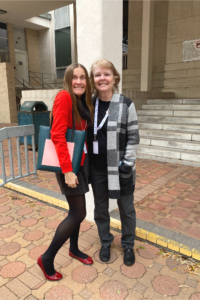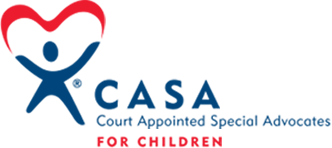February 2023 Advocate Spotlight: Elizabeth Barham and Susan Sharp

We invite you to meet Elizabeth Barham and Susan Sharp, nominated by Case Supervisor Rosario Salinas.
“Elizabeth and Susan have partnered on a case with many challenges,” Rosario said. “They’ve gone above and beyond the past few months to advocate for a teen girl who is not placed in the Houston area. Recently, they were unable to reach the child or her placement after several attempts. Since there was concern about her placement, Elizabeth and Susan jumped in the car together and drove several hours to see her face-to-face and ensure that she was safe.”
We asked Elizabeth and Susan to share their experiences as Advocates.
Is there anything unique about your background that contributes to your approach to advocacy?
Elizabeth: I worked as a paralegal in family law, which helped me to view advocacy for people without financial means as an important and underserved part of every community.
Susan: My oldest child is adopted. The process made me aware of the circumstances of so many children.
Did you have any reservations about volunteering?
Elizabeth: Reservations about volunteering? No. Would I give my cup of water to someone suffering from dehydration? Yes. “I alone cannot change the world, but I can cast a stone across the waters to create many ripples.” — Mother Teresa
Susan: Not really. After starting the training program, I knew I would be supported.
Explain the work you do as a CASA aDVOCATE. Why is it important for a child in care?
Elizabeth: I spend time with children who are in a difficult part of life. No one got a handbook on life, and people make mistakes, some larger than others. I build relationships with children affected by adult mishaps. I also get to know the adults in their lives, helping them grow from the situations that brought the children into CPS care. Every child needs some form of consistency, and I believe that every Advocate is important for that reason.
Susan: It’s not just about advocating for the child in court. You must build a bond with them so they open up to you and trust you to communicate their needs. For some of these kids, we are the only adult they are comfortable with.
What has surprised you most about your aDVOCACY work?
Elizabeth: The strength of the relationships that I build with all the family members that are involved.
Susan: I’m surprised how great the need is for Advocates and good foster placements.
What have you learned about children in care?
Elizabeth: Older children in care are underserved. I became involved with CASA because I wanted to help children, and after volunteering, it has only become even more apparent how much support the child welfare system needs.
Susan: The statistics on the outcomes of foster youth are heartbreaking. As much as we try, we will never be able to reach them all. Teenagers have the greatest need. Their situations are often more complicated, and many times, they are harder to place. Most come into care with a lack of education and years of mistrusting adults. They need help to prepare for adulthood.
Is there a particular moment or memory that stands out for you?
Elizabeth: Live in the moment, and every moment is important.
Susan: My proudest moment was when I advocated for a child with severe medical issues, and she was adopted by the most loving couple. They still send me pictures of her.
Share about your experience of working with a co-Advocate?
Elizabeth: My co-Advocate, Susan, has become one of my favorite people. I will always be grateful that I’ve been blessed to have a strong relationship with a wonderful woman that I never would have met otherwise.
Susan: I love working with Elizabeth. We hit it off right away. We both have a unique relationship with the child, which gives us different perspectives and helps us better advocate for the child.
How did you establish division of responsibilities? What are they?
Elizabeth: Susan does the lion’s share of the legwork. I work full-time and have another two intertwined cases. Susan spends a voluminous amount of time working for our child. She is always available on my lunch breaks and on my drive home to fill me in on what she has done. She is the closest thing I have met to a unicorn.
Susan: Elizabeth works full-time, which makes it difficult to make phone calls or send emails during the day. I usually gather the information, such as educational and medical. Elizabeth has had a longer relationship with the child since I was added later in the case. I feel that the child confides in her more. We both visit the child together.
How do you communicate about the case?
Elizabeth: We talk to each other for hours each week. I love and appreciate Susan, and I hope she knows it.
Susan: Sometimes it’s an email or text, but Elizabeth and I talk several times a week.
How does having a co-Advocate on the case benefit the child and advocacy?
Elizabeth: In more difficult cases, the more people and unique perspectives, the better. It has definitely benefited me to have Susan. You won’t just get a co-Advocate, you’ll get, what I imagine to be, a lifelong friend.
Susan: It benefits the child by having more trusted adults on their side who are advocating for them. It benefits our advocacy because we all have different experiences that we bring to the table.
Would you recommend working with another Advocate?
Elizabeth: Yes. I firmly believe that the universe puts what you need in front of you. For me, it was and is Susan, and I will always be grateful and in awe of the wonderful person she is.
Susan: Absolutely! Elizabeth has become a lifelong friend. Just having someone to bounce frustrations off is beneficial.
What are some best practices for working with a co-Advocate?
Elizabeth: Susan came into the case when things were taking a turn for the worse. I don’t know how I would manage without her. Sometimes, I feel selfish that I do not have the time to help with the phone calls and dealing with placements and agencies that Susan does for both of us without ever complaining or lamenting the work that she does, mainly for our child, but for both of us as well. Best practices? Get Susan, but don’t ever try to take her away from me! We need to get “Best Advocates Forever” necklaces in the near future.
Susan: Set up a system to keep each other up to date. Be open minded to accept the other Advocate’s ideas and perspectives.
EVERY CHILD DESERVES A CHANCE … IT’S YOU!
Learn more about becoming a CASA volunteer: VOLUNTEER or give online DONATE
